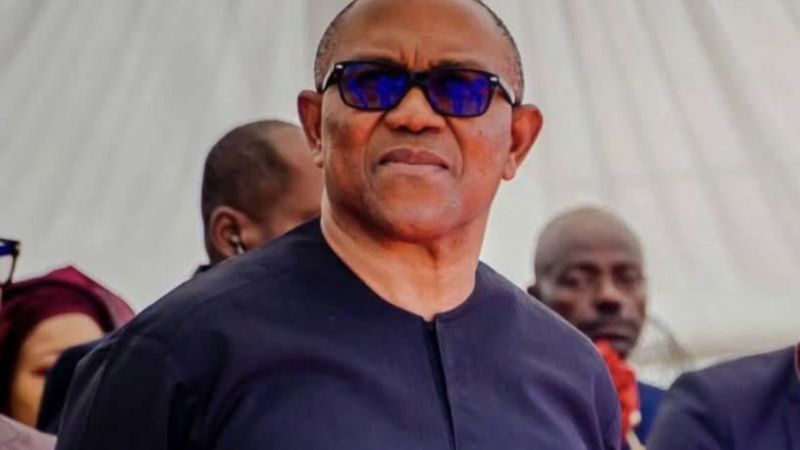Former presidential candidate of the Labour Party, Peter Obi, on Tuesday, expressed concern over Nigeria’s growing debt burden, describing the current borrowing trend as unsustainable and lacking in accountability.
Obi stated that his remarks followed the Senate’s recent approval on July 22, 2025, of an additional $21 billion, €2.2 billion, and ¥15 billion in external borrowing for the 2025–2026 fiscal cycle.
He also noted that the Senate approved a N750.98 billion domestic bond issuance and a €65 million grant.
With Nigeria’s public debt already standing at N149.39 trillion in the first quarter of 2025, Obi noted that the newly approved loans, estimated at about N37.2 trillion, would raise the total debt to approximately N187 trillion. He warned that the figure could exceed N200 trillion by year-end.
In a statement on Tuesday via X, he said, “As our GDP before rebasing was about N269.2 trillion (about $180 billion), the government has borrowed the equivalent of nearly 70% of our previous GDP. Even after the rebasing, which pushed our GDP to about N372.8 trillion (about $243.7 billion), the government would have borrowed about 50.16% of the new GDP (with the approved loans), the highest debt-to-GDP ratio in our history as a nation.”
Obi lamented that the borrowing spree has yielded minimal returns in critical areas such as education, healthcare, security, and infrastructure. He cited statistics showing a year-on-year debt increase of N27.72 trillion and a quarter-on-quarter increase of N4.72 trillion.
Former presidential candidate of the Labour Party, Peter Obi, on Tuesday, expressed concern over Nigeria’s growing debt burden, describing the current borrowing trend as unsustainable and lacking in accountability.
Obi stated that his remarks followed the Senate’s recent approval on July 22, 2025, of an additional $21 billion, €2.2 billion, and ¥15 billion in external borrowing for the 2025–2026 fiscal cycle.
He also noted that the Senate approved a N750.98 billion domestic bond issuance and a €65 million grant.
With Nigeria’s public debt already standing at N149.39 trillion in the first quarter of 2025, Obi noted that the newly approved loans, estimated at about N37.2 trillion, would raise the total debt to approximately N187 trillion. He warned that the figure could exceed N200 trillion by year-end.
In a statement on Tuesday via X, he said, “As our GDP before rebasing was about N269.2 trillion (about $180 billion), the government has borrowed the equivalent of nearly 70% of our previous GDP. Even after the rebasing, which pushed our GDP to about N372.8 trillion (about $243.7 billion), the government would have borrowed about 50.16% of the new GDP (with the approved loans), the highest debt-to-GDP ratio in our history as a nation.”
Obi lamented that the borrowing spree has yielded minimal returns in critical areas such as education, healthcare, security, and infrastructure. He cited statistics showing a year-on-year debt increase of N27.72 trillion and a quarter-on-quarter increase of N4.72 trillion.
“We are accumulating very exponential levels of unsustainable debt with little or nothing to show for it in critical areas such as education, healthcare, electricity generation, security of lives and property, and pulling people out of poverty,” he said.
The former Anambra governor highlighted the persistent deterioration in human development indices, noting that education is underfunded, healthcare remains inaccessible to millions, and insecurity has worsened.
“Over 10,217 people have been killed and 672 villages sacked between May 29th 2023, and May 29th 2025, even when security spending has significantly increased from N2.98 trillion in 2023 to N4.91 trillion in 2025,” Obi said.
He added that infrastructure across the country remains in disrepair, with about 135,000 km of the country’s 195,000 km road network still unpaved and largely unusable.
Obi also drew attention to the struggling power sector, pointing out that the national grid continues to supply less than 5,000 MW for over 200 million Nigerians.
“Today, over two years after the present government took over and with all the humongous borrowing, we are still confronted with negative reports of worsening poverty with about 133 million (63%) Nigerians classified as multi-dimensionally poor,” he stated.
Referencing a report by Médecins Sans Frontières (Doctors Without Borders), Obi highlighted the worsening malnutrition crisis in Northern Nigeria, with Katsina State among the hardest hit. According to him, the tragic news of 652 child deaths underscores the urgent need for a change in governance approach.
“This is a country blessed with enormous resources, yet nobody should go to bed hungry. Still, a persistent deficiency in leadership has thrown the majority of our citizens into increasing multi-dimensional poverty,” Obi said.
He clarified that while borrowing in itself is not bad, it must be sustainable and tied to productive ventures with clear outcomes.
“Unfortunately, this current pattern of borrowing without accountability, without transparency, and without transformational impact is simply mortgaging the future of our children,” he warned.
Obi urged the government to consider the inter-generational consequences of its financial choices and adopt a more responsible economic management style.
“We must return to a disciplined and prudent economic management culture, cutting the cost of governance, blocking leakages, investing in human capital, and building a productive economy.
“It is time to stop this fiscal indiscipline. We must build a New Nigeria, where leadership is responsible, development is people-centred, and every kobo borrowed or spent delivers a measurable impact,” he said.


